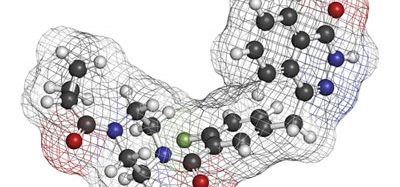Existing cancer drugs could become new Alzheimer’s treatments
Posted: 17 November 2021 | Anna Begley (Drug Target Review) | No comments yet
An experimental drug for liver cancer and Dasatinib, approved for chronic myeloid leukaemia could be repurposed to treat Alzheimer’s disease.


A pre-clinical study from the National Institute on Aging (NIA) and collaborating universities in the US has revealed that existing and emerging cancer drugs could be repurposed as therapies to be tested in clinical trials for people at genetic risk of Alzheimer’s disease.
NEWS: Chemotherapy drug reverses Alzheimer’s symptoms in mice
READ HERE
The research team identified brain protein changes related to the APOE4 genetic risk variant in young postmortem study participants (average age at death was 39 years) and compared these changes with those in the autopsied brains of people with Alzheimer’s and those without (average age at death was 89 years).
The analyses included brain samples from the Baltimore Longitudinal Study of Aging, the Religious Orders Study, and other NIA-funded studies. The researchers tested whether existing US Food and Drug Administration (FDA)-approved or experimental drugs for other diseases act upon some of these proteins.
Reduce preclinical failures with smarter off-target profiling
24 September 2025 | 15:00PM BST | FREE Webinar
Join this webinar to hear from Dr Emilie Desfosses as she shares insights into how in vitro and in silico methods can support more informed, human-relevant safety decisions -especially as ethical and regulatory changes continue to reshape preclinical research.
What you’ll learn:
- Approaches for prioritizing follow-up studies and refining risk mitigation strategies
- How to interpret hit profiles from binding and functional assays
- Strategies for identifying organ systems at risk based on target activity modulation
- How to use visualization tools to assess safety margins and compare compound profiles
Register Now – It’s Free!
The drugs also reduced neuroinflammation, amyloid secretion, and tau phosphorylation in cell culture experiments, underscoring their potential as candidates to be tested in Alzheimer’s clinical trials.”
Their findings, published in Science Advances, showed that an experimental drug for liver cancer and Dasatinib, approved for chronic myeloid leukaemia, act upon some of these Alzheimer’s disease related proteins, suggesting they could be potential Alzheimer’s therapies. The study also showed that the drugs reduced neuroinflammation, amyloid secretion, and tau phosphorylation in cell culture experiments, underscoring their potential as candidates to be tested in Alzheimer’s clinical trials.
The findings follow another recent study showing that treating mice that expressed the human APOE4 gene with the potent diuretic bumetanide reduced learning and memory deficits. According to the researchers, next steps could include testing these drugs in clinical trials. For those already FDA-approved or that have already been tested for safety in other trials, the timeline for testing could be decreased.
Related topics
Drug Repurposing, Drug Targets, Genetic Analysis, In Vivo, Oncology, Protein, Therapeutics
Related conditions
Alzheimer’s disease, Chronic myeloid leukaemia (CML), Liver cancer
Related organisations
National Institute on Aging (NIA), US Food and Drug Administration (FDA)








